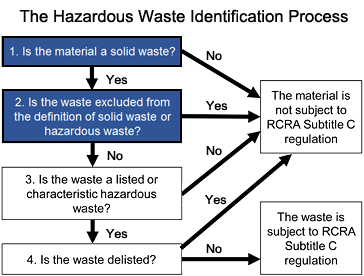Getting The Reclaim Waste To Work
Getting The Reclaim Waste To Work
Blog Article
The Greatest Guide To Reclaim Waste
Table of ContentsSome Ideas on Reclaim Waste You Need To KnowThe Reclaim Waste StatementsThe Greatest Guide To Reclaim WasteMore About Reclaim WasteThe Reclaim Waste Diaries
With correct liquid waste management, business can reduce energy-intensive treatment procedures and disposal prices. They likewise obtain to conserve resources and allot them in other pertinent procedures. There are various regulations that shield public health and the setting. By following a system for managing liquid waste, companies can prevent costly penalties and penalties and prevent adverse promotion.(https://reclaim-waste.jimdosite.com/)Collect depictive samples from various factors within the waste stream to guarantee precision. Conduct periodic screening to track any type of changes in the composition. Preserve in-depth documents of characterization for future referral and conformity objectives. Liquid waste, specifically unsafe ones, positions considerable risks throughout this action. Appropriate treatments reduce spills, leakages, and various other mishaps that can harm the workers and the general public.

Disinfection (e.g., chlorination, ultraviolet light, ozonation) and nutrient elimination (e.g., denitrification and phosphorus elimination) are recommended under rigid policies. Many firms breached a number of fluid waste disposal policies in current years.
8 Easy Facts About Reclaim Waste Explained

are utilized by industries that create huge quantities of low-toxicity fluid waste. Shallow containers include fluid waste that is enabled to vaporize with all-natural procedures. The deposit left can be disposed of in landfills. involves melting fluid waste at heats and transforming it right into gas and ash. This kind of disposal is subject to rigorous ecological policies because of potentially dangerous emissions.
The findings must be recorded, examined, and saved not simply for submission to regulative authorities yet likewise for making enhancements in the future. Share info with relevant stakeholders (e.g., employees, governing government firms, and neighboring communities) to keep transparency and liability.
Regardless of the company size or sector, there are my response many difficulties connected with this task. Comprehending these can aid them properly manage their procedures and minimize their ecological effect. makes it tough to deal with and dispose of fluid waste securely. Firms that can not buy facilities need to take into consideration teaming up with the general public field for much better services.
Not known Facts About Reclaim Waste
By carrying out extensive administration systems that include treatment and recycling methods, routine tracking, threat analyses, and adherence to local and federal policies, industrial centers can add to the security of groundwater materials, guaranteeing their availability for future generations (liquid waste removal). Let's look into the significance of reliable liquid waste management in the industrial industry, concentrating on its implications for securing groundwater sources
The contamination of groundwater sources due to inappropriate liquid waste monitoring in the industrial sector has far-ranging effects for human health and wellness, farming, and the setting overall. A few of the prospective impacts triggered by such pollution include: Infected Drinking Water Supplies: As groundwater supplies a significant part of our drinking water, contamination from commercial activities can lead to harmful chemicals and bacteria entering our water systems, presenting wellness threats for people.
Reduced Agricultural Productivity: Farming depends heavily on groundwater for watering; therefore, polluted water can hinder crop yields, infect agricultural items, and impact food safety and security. Offered the significance of protecting groundwater resources, it is essential for companies to take a proactive stance in managing their liquid waste properly and stopping contamination.
What Does Reclaim Waste Mean?
Liquid waste can contaminate land and contaminate waters. Info regarding managing and storing fluid waste, responding to spills and minimizing liquid waste is offered in the following fact sheets and support:.
The duty of waste management professionals in protecting this priceless resource can not be overemphasized. Contaminated water and contaminated effluent management: Guaranteeing that dangerous fluids are safely gotten rid of and treated prior to they can harm our water sources.
Therefore, integrating sustainable liquid waste monitoring right into economic planning boosts financial security and secures the setting, demonstrating the worth of this strategy. In verdict, adopting professional fluid waste monitoring methods is crucial for making certain a lasting future, shielding our environment and safeguarding the well-being of future generations.
When it pertains to taking care of waste, adhering to correct treatments is crucial for a plethora of factors. Correct waste disposal is not almost tidiness; it's regarding ensuring the wellness of our environment, wellness, and the efficient use resources. Recognizing the value of effective waste monitoring can aid us all contribute to a healthier, cleaner planet.
The Basic Principles Of Reclaim Waste
Reliable waste monitoring helps keep clean streets and public rooms, minimizing the aesthetic influence of clutter and ensuring that waste does not damage wildlife. When waste is not disposed of appropriately, it can cause contamination, where hazardous materials can leach into the soil, water systems, and the air, developing long-term environmental problems.
Report this page